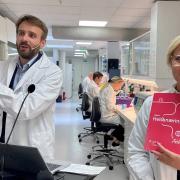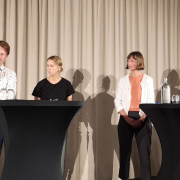A roadmap for the health industry
How will Norway commercialise research and turn health into a green export success?
The roadmap for the health industry was released today by Ingvild Kjerkol, Minister of Health and Care Services, and Jan Christian Vestre, Minister of Industry, Trade and Fisheries. The roadmap includes 12 focus areas and 41 actions, which the two ministries have worked together with industry to identify.
Commercialising research
One of the focus areas is testing and piloting of novel health solutions.
“We will become better at commercialising research results and create industry. We want the state to contribute considerably more so companies have access to testing facilities, so they can develop their solutions. We will develop the catapult scheme for the health industry,” said Vestre.
Today there is no health catapult in Norway. SIVA, the Research Council of Norway and Innovation Norway will now investigate how the health industry can better utilise the catapult scheme.
“The health clusters are ready to contribute! Based on work we did in 2019 and 2020, Oslo Cancer Cluster, Norwegian Smart Care Cluster and Norway Health Tech have set up Health Catalyst, a national arena for developing, testing and piloting novel solutions in health. Among other things, we have signed an agreement to collaborate with Nortrials,” commented Ketil Widerberg, general manager of Oslo Cancer Cluster.
A green export opportunity
In 2021, the Norwegian health industry had a total turnover of NOK 65 billion, where NOK 22 billion came from export alone, according to a Menon Economics report (2023).
“The health industry has a natural place in a low emission society. We believe we can increase the export from the health industry considerably, and this will contribute to solve global challenges and create workplaces in our own country,” commented Vestre and added there will be additional funding for this.
The Norwegian health industry is united through the clusters and is ready to contribute as the government launches this historical investment.
“When we work with pharma and biotech, we create green workplaces. We work to establish national production, local testing, and precision medicine, which will shorten value chains, as well as decrease transport and logistics,” commented Widerberg.
A supercluster is needed
The Norwegian clusters were also mentioned especially for their ability to facilitate collaboration and knowledge transfer between large and small companies, and research environments – which will strengthen the success of Norwegian export.
“We want to clarify that the three internationally renowned, National Centres of Expertise (NCE) clusters in health, including Oslo Cancer Cluster, Norwegian Smart Care Cluster and Norway Health Tech, wish to unite into a supercluster.
“We hope the revised cluster programme builds on an understanding that all parties must contribute to the development and financing of the clusters to make public-private collaboration a reality,” commented Widerberg.
Towards a Cancer Mission?
Kjerkol also mentioned several actions that will make a big difference for the development of cancer therapeutics and diagnostics in Norway. These include:
- Securing that research milieus in the private and public sector get guidance on clinical studies
- Developing the Directorate for Medical Products
- Facilitating access to health data for the health industry
- Investing in clinical studies and personalised medicine
- Creating a strategic arena for dialogue between health authorities and industry
“Oslo Cancer Cluster is delighted that input we have made over the last two years towards public policy are taken seriously in this roadmap, but there is still work to do. Our project CONNECT shows the opportunities of public-private collaboration in implementation of precision medicine including regulatory innovation. We applaud that the government wants to build on this.”
“We believe these combined efforts represent the first steps towards Norway making its mark internationally and are a contribution to the European Mission on Cancer,” said Widerberg.
Oslo Cancer Cluster has set up a hub to pursue the EU’s Cancer Mission nationally, together with the Research Council of Norway, the Cancer Society and several other key players.
- Read our previous input on public policy here.
- Read what we recently wrote on Norwegian health data here: Kreftregisteret er næringspolitikk (in Norwegian)



 Brett Jordan/ Unsplash
Brett Jordan/ Unsplash






